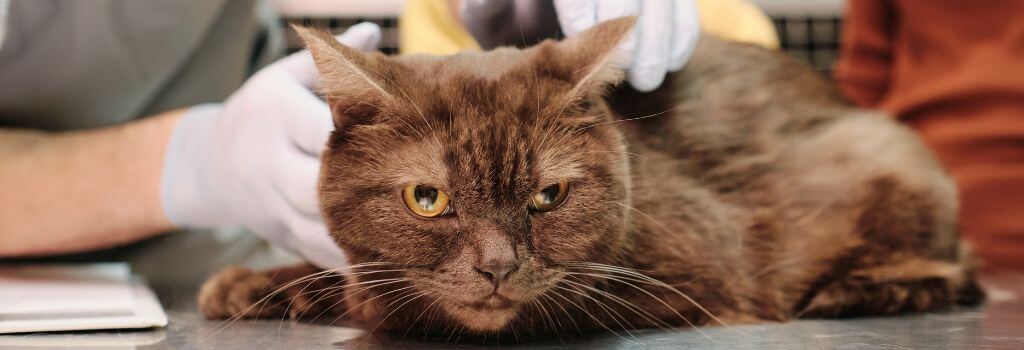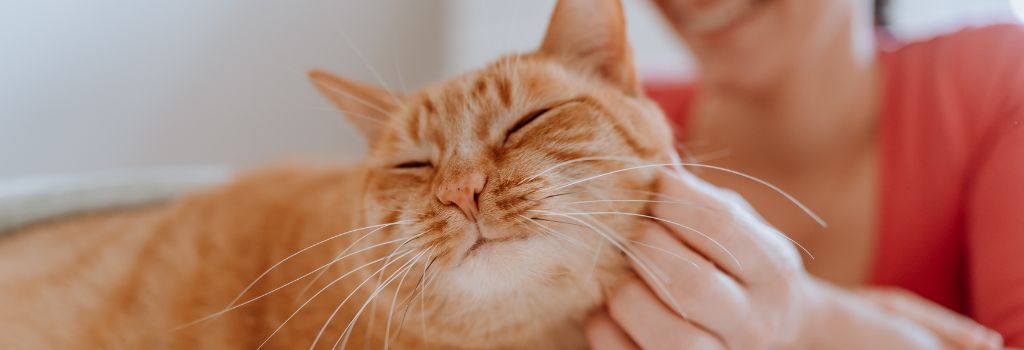Cats are true masters of disguise. They can squeeze into the smallest spaces, conceal themselves in hard-to-find places, and even mask their pain from their owners. It can be quite challenging to tell when your feline friend needs a bit of medical attention. This may explain why more than 90% of dog owners make sure to take their pups to the vet each year, while only around 40% of cat owners do the same.
The truth is, just like dogs, cats need regular checkups to stay healthy and catch potential issues before they become serious. Let's explore why annual veterinary visits are crucial for your cat's well-being and what to expect during your visit to Crosslake Veterinary Hospital.
Two Important Factors to Remember About Cats
1. Cats Age Faster Than Humans
Cats age more rapidly than we do, so skipping even one vet visit is like missing several years of healthcare. A single year in a cat's life can be equivalent to multiple human years. Regular exams with your cat’s veterinarian help us get a better understanding of your cat’s baseline health. Knowing what’s “normal” for your pet will help us recognize what’s “abnormal,” address new issues earlier, and stay ahead of potential health concerns.
2. Cats Are Experts at Hiding Illness
Unlike dogs - who often wear their hearts on their sleeves - cats instinctively hide signs of discomfort. In the wild, showing weakness makes them vulnerable, so they instinctively hide symptoms of illness or pain. This means that by the time a cat outwardly shows signs of being sick, the condition may already be advanced. Bringing your cat in for regular wellness exams allows your veterinarian to detect subtle health changes before they become serious problems for your pet.

How Often Should My Cat Have an Exam?
While most adult cats should see a vet once a year, other life stages or conditions may require more frequent visits:
- Kittens (under 1 year): Like human babies, kittens need several visits for vaccines, deworming, and developmental checkups throughout their first year.
- Adult Cats (1-7 Years): Even healthy cats need an annual wellness exam to detect early signs of illness, discuss diet and behavior, and stay current on vaccinations.
- Senior Cats (8+ Years): Older cats are more prone to chronic conditions such as kidney disease, arthritis, or dental problems. For them, checkups every 6 months are recommended to stay ahead of health changes.
If your cat hasn't been to the vet in a while, now's the perfect time to schedule that wellness exam!
What Happens During a Cat Wellness Exam?
A feline wellness exam focuses on seven key health checkpoints, designed to catch potential issues early and ensure your cat's overall well-being:
The seven key areas of a feline wellness exam include:
- Comprehensive Physical Examination: Your vet will check your cat from head to tail, assessing their weight, coat, skin, eyes, ears, and more. They'll also gently examine the abdomen and joints for signs of swelling, pain, or other abnormalities.
- Behavior and Lifestyle Discussion: Understanding your cat's daily routine, environment, and behaviors helps identify issues like stress, anxiety, or subtle signs of illness.
- Nutritional and Weight Assessment: Your cat will be weighed and given a body condition score. Based on this and their lifestyle, your vet can tailor dietary recommendations.
- Oral Health Evaluation: Dental disease is common in cats by age four. The vet will check for plaque, gingivitis, or signs of oral pain.
- Laboratory Testing: Blood and urine tests can reveal underlying conditions such as kidney disease, diabetes, or infections - often before symptoms appear.
- Parasite Screening & Prevention: Even indoor cats can get parasites. A stool sample is analyzed, and your vet will recommend preventative treatments tailored to your cat's lifestyle.
- Vaccinations & Preventive Care: Based on your cat's age, environment, and risk factors, a customized vaccination and prevention plan is created.
Reducing Vet Visit Stress for Cats
Many cat owners avoid vet visits due to the stress it causes their pets. Fortunately, with a bit of preparation, vet visits can be much less daunting.
- Familiarize them with the carrier: Keep the carrier out in a cozy, familiar place with soft bedding and treats. Let your cat explore it at their own pace.
- Try calming aids: Pheromone sprays, calming treats, and diffusers can help ease stress during car rides and exams.
- Gentle handling and a soothing voice: These small acts of kindness can make a big difference for your cat's comfort during their visit.
If your cat experiences significant stress during car rides or veterinary visits, your veterinarian may recommend anti-anxiety medication to help ensure a calmer, more comfortable experience.

Prioritizing Your Cat’s Health
Caring for your cat involves more than simply providing a litter box, food, and a comfortable sunny spot. Regular veterinary exams form the basis for their overall health. By committing to regular veterinary visits and working with a team that values a stress-free experience, pet owners can overcome obstacles that often prevent cats from getting the care they actually need.
Every visit to the vet, whether it’s a kitten’s first appointment or a senior cat’s bi-yearly exam, is a chance to support your cat’s health. Taking a proactive approach to feline healthcare means that more cats can enjoy longer, healthier lives—just as they deserve!
Remember, routine exams are just as important for cats as they are for dogs!
If you have questions and you'd like to reach out to us, you can call us directly at (218) 692-4400, or you can email us at [email protected]. Don't forget to follow us on social media Facebook, Instagram.

